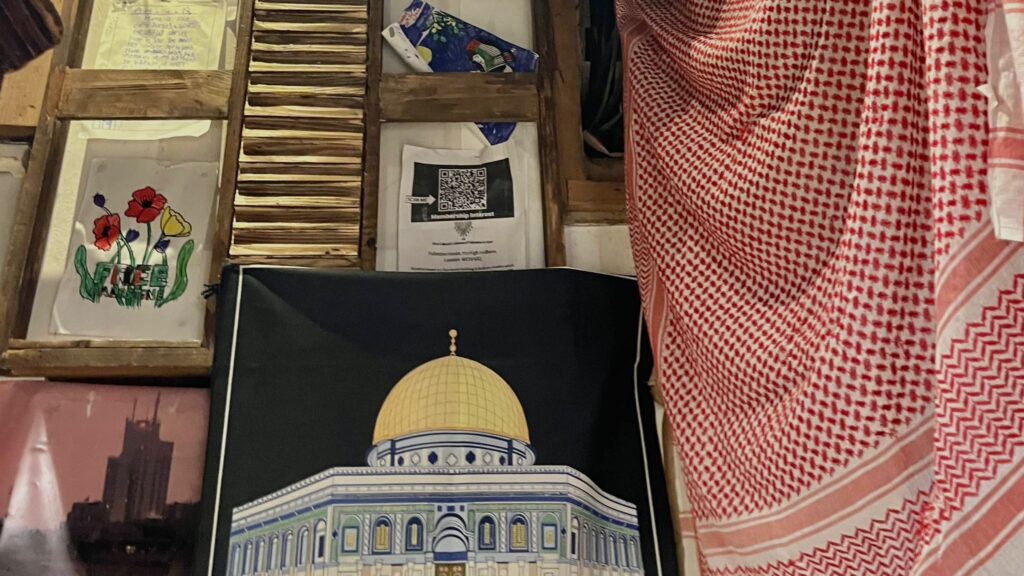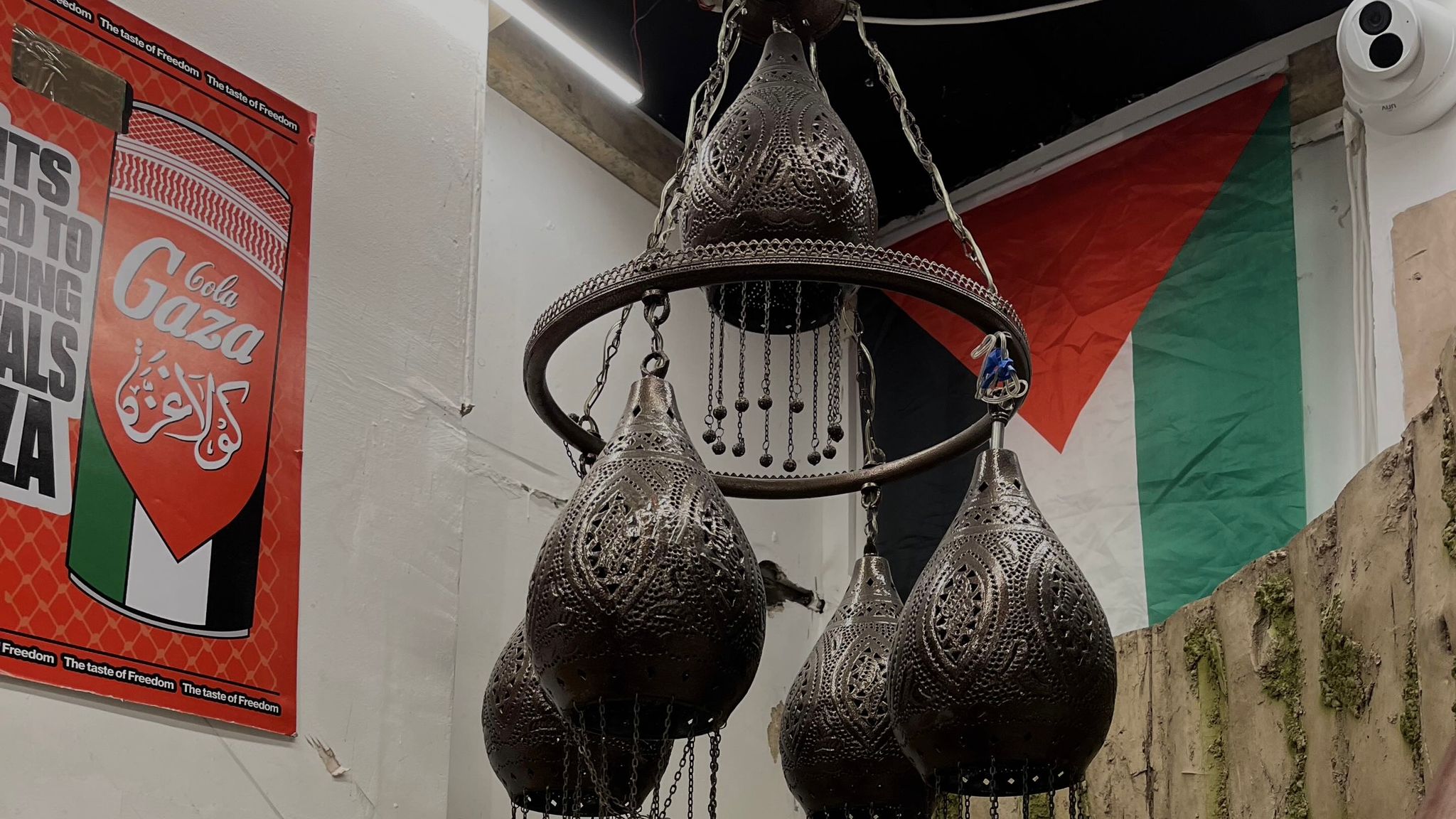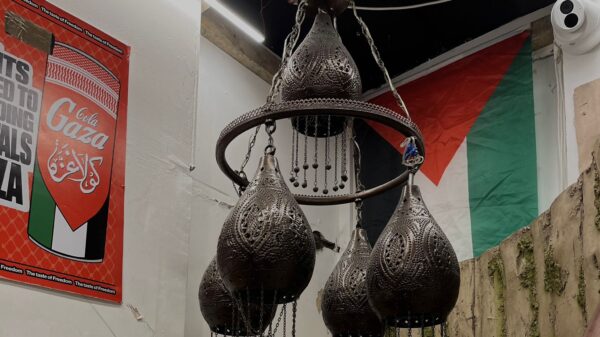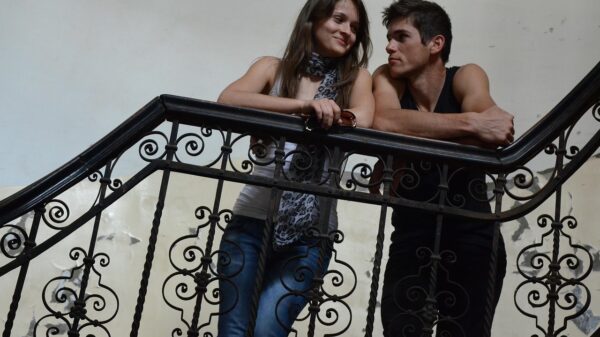‘From Ground Zero’ was first screened in the UK at the London Palestine Film Festival (LPFF) in November of 2024. Ten months later, on Friday the 12th of September, the film will have a nation-wide cinema release, having been shortlisted for Palestine’s official submission to the 2026 Academy Awards. Since last year, there have been various low-profile screenings held in support of the film. In February this year, I sought out one such event – and the less than conventional viewing experience proved far more fitting than a multiplex.
In Holborn, next to a tempting Palestinian restaurant, behind a curtain of scaffolding, is an unsuspecting door, painted with a patchwork of duct tape. At first I thought I had the wrong address, but behind it was the stairwell to Palestine House. A rustic, narrow staircase surrounded by Palestinian flags and draped with red and white keffiyehs, the journey up to the screening was a walkway into a home. The floor is littered with plastic chairs, mats on the floor and cushioned benches, leading onto the balcony. Homely and welcoming, the abode feels like a big family crammed into the living room. In the back of the open space, is the kitchen, so wafts of knafeh and aromatic tea perfume the communal area.

Before the film began, we were greeted by an amplified voice. ‘As-salamu alaykum’ it called to us, the audience replying ‘wa-alaykum salaam’ in beautiful unison. The man behind the microphone then appeared in front of the screen and gave a brief introduction, apologetically remarking that their projector set-up is ‘not the Vue’. This was the last moment of levity.
‘From Ground Zero’ is compiled of twenty-two short films overseen by director Rashid Masharawi. Each one is no longer than seven minutes in duration, and is made up of footage captured by Palestinians in Gaza in late 2023.
Stylistically they vary; some are fictional representations of their contemporary reality; including the film ‘No Signal’ – where a man searches for his brother under rubble. He is convinced his brother is alive. He could hear breathing in their final phone call, before the battery died. As he rummages through the debris, he desperately gives his phone to his brother’s young daughter and she places calls, also thinking her father is alive. Whilst this episode is acted, it is recorded amongst the danger, amidst the bombs. Within the anguish and the cries of the little girl awaiting her father’s improbable return are harrowingly uninhibited. Like many of the films, this is shot with handheld camera that shakes with the fear and urgency of its situation, relaying the internal turmoil of a distressed family as well as the chaotic destruction of land and property that is ensuing around them.
Mostly, the short films have been minimally edited, in order to convey the raw truth of the viscerally brutal livelihoods of the residents in Gaza. However, the edit in the middle of ‘Taxi Wasinna’ heightens the potent resonance of a striking scene. Directed by Etimad Washah, it begins with a man sat upon a donkey and intended to trace this relationship. Instead the film abruptly interrupts itself and we see Washah speaking directly down the lens. One day into production, her brother’s house was bombed, killing him and his children. Her voice breaks in her explanation, for she is too grief-stricken to continue with the film as she had set out. The circumstances have changed; an artistic endeavour is futile.
This artistic conflict reverberates in Ahmed Hassouna’s film ‘Sorry Cinema’, in which he outlines his own relationship to filmmaking. After making a name for himself in the Palestinian cinematic community, the film he had spent years devoted to could not be completed – because of the war. Once an optimistic budding artist, a tragic cynicism arises in Hassouna as he narrates his own life and evaluates his fragile connection toward the medium he had revered.
Unlike in his previous work behind the camera, ‘Sorry Cinema’ sees him become the subject of the story; chasing planes to receive food that drops from the sky, doing everything to survive, to sustain his family. He, and the men surrounding him, pick loose flour from the sandy ground, as their desperation supersedes any spare thought for hygiene. Because wasting precious ingredients amidst starvation is not an option. It is this immediacy that ignites a ferocious empathy in audiences; hostility is not just imminent but presently ongoing. The damage is done, lives have been taken, and that collateral will not be recovered.
Each short film opens with a title and ends fading to black, before proceeding into the next one. It is a soberingly restrained editing approach that simply weaves the stories together. Fragments of a nation’s enduring battle, they are united in struggle. Though the vignettes are strikingly poignant in their brevity, their economical runtime is born of necessity.
Orson Welles is credited with the quote ‘The enemy of art is the absence of limitation’, and these Palestinian filmmakers are limited in resources beyond those required for a scene. Their homes are bombed mid-shoot; their relatives are being killed. ‘From Ground Zero’ cannot be characterised as a solely artistic endeavour for the stories have no third act, they cut before the opportunity for resolution. To chronicle intimate strife is a plea for freedom from the limitations being violently imposed by the enemy in warfare.
The film ended and a woman helping with the screening asked how we were feeling. ‘Heavy’ was the only response. The only audience question was whether all the filmmakers were still alive and, as of February 1st 2025, they are. There was a palpable shared gravitas amongst us, the viewers, having collectively watched several accounts of an ongoing humanitarian crisis, aware of our own complicity in observing ground zero from two thousand miles away. The man who had introduced the film took it upon himself to deliver a lecture which appeared impromptu, though perhaps refined for having spoken on the matter so frequently. He explained that he had tried to arrange a Zoom call with one of the filmmakers to precede our screening, but this filmmaker was in Gaza sharing a sim card with thirty other people. It is such context that reinforces the feat of this film.
At the time of my viewing ‘From Ground Zero’ was not available for streaming. It is accumulating a viewership, with backing from their Academy Award winning executive producer, Michael Moore, as well as showings at numerous film festivals and continuous promotion by Palestine House. The unique viewing environment was as transportive as the film. They take you in from the isolating London bustle and treat you to the warmth of Palestinian hospitality making the real suffering on screen that much closer to home. Fortunately, the film will soon be accessible to a broader cinema-going audience and I am certain the humanity will still resonate through the big screen.












